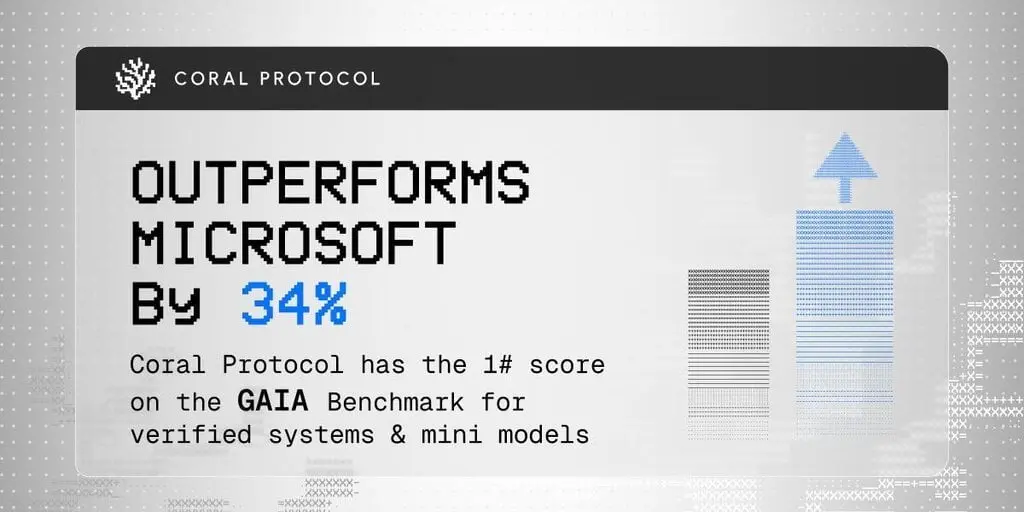Coral Protocol Outperforms Microsoft-Backed Rival by 34% on GAIA AI Benchmark
2 Sources
2 Sources
[1]
Coral Protocol Outperforms Microsoft by 34% With Top GAIA Benchmark for AI Mini-Model - Decrypt
Coral Protocol's multi-agent system has outperformed the Microsoft-backed Magnetic-UI by an unprecedented 34% on the GAIA Benchmark, demonstrating a productive alternative to vertical scaling in AI. The protocol has vowed to surpass modern AI performance limits by scaling systems horizontally, favoring intelligent orchestration over constant parameter extension. Coral achieved the highest score on the GAIA Benchmark for verified systems using mini agents, validating NVIDIA's thesis that smaller models - when orchestrated intelligently - represent the industry's future. However, the team say the result had less to do with building a powerful system than altering the way we think about scaling AI systems themselves. An open protocol, Coral is designed to push AI beyond its typical capacity. Rather than scaling up general models, it facilitates the scaling of intelligence by layering in focused, specialized agents from around the world. Through secure, parallel, multi-agent coordination, Coral enables any language model - large or small - to operate more effectively, delivering superior reasoning, planning, and problem-solving. "This breakthrough marks a turning point in AI infrastructure," says Coral CTO Caelum Forder. "It's proof that horizontal scaling isn't just possible - it's practical, and Coral is the most effective way to do it. The Internet of Agents is now a working reality. If you are an agent developer, just Coralise it. If you are an application developer, build it better for less using our infrastructure." Competition between entities looking to create the most advanced agentic system has intensified, with the trend towards building larger models to handle ever more complex tasks. Coral's results, however, fly in the face of convention and bear out the findings of a recent NVIDIA paper showing that smaller systems are sufficiently powerful - and do not sacrifice on speed, security, and cost. A multi-layered evaluation suite for advanced AI capabilities, the GAIA Benchmark is used to determine the ability of AI systems to solve real-world tasks requiring significant time and effort for skilled humans. It takes the form of 450 non-trivial questions demanding intensive research, data analysis, and reasoning. Developed to evaluate LLM agents on their ability to act as general-purpose AI assistants, GAIA is the industry standard for measuring model performance. Coral's GAIA Agent System used in the test is an application built on the eponymous protocol and heavily inspired by CAMEL's OWL. It deploys specialized agents for a multitude of tasks such as answer finding, assistance, critique, image analysis, planning, problem solving, search, video processing, and web browsing. Agents interface with one another using the Coral server's MCP communication tools. Topping the GAIA Benchmark leaderboard for small models illustrates Coral's ability to improve the capabilities of all AI systems through graph-based architecture. In the process, it gives developers confidence they can create powerful yet lightweight agents supported by small models. Such systems are capable of working with more information, are more easily integrated into other ecosystems, and benefit from better interconnectivity. "The role of small models in agentic systems has been undersold to date, but the tides are starting to turn," says Caelum Forder. "We have proven that such models can scale beyond their previously known limits and outcompete the incumbents. I'm confident they have a central role to play in the future of agentic AI." About Coral Protocol Coral Protocol is an open and decentralized collaboration infrastructure that enables communication, coordination, trust and payments for The Internet of Agents: laying the foundation for safe AGI. Coral is the decentralized protocol powering AI agent collaboration, trust, and payments; laying the foundation for safe AGI. Disclaimer: Press release sponsored by our commercial partners.
[2]
Coral Protocol Beats Microsoft-Backed Rival By 34% On Key AI Benchmark - Microsoft (NASDAQ:MSFT)
Coral Protocol's multi-agent AI system has achieved a 34% performance lead over Microsoft MSFT-backed Magnetic-UI on the GAIA Benchmark, a widely used test to measure AI's ability to solve complex, real-world problems. The result signals a noteworthy departure from the prevailing industry trend of scaling through ever-larger models. The London-based open protocol secured the highest verified score for mini-model agents, providing practical validation of NVIDIA's thesis that small, orchestrated models can match or exceed the performance of their larger counterparts. Coral's horizontal scaling approach layers specialized agents instead of expanding single large models, increasing overall effectiveness in reasoning, planning, and problem-solving. "This breakthrough marks a turning point in AI infrastructure," said Caelum Forder, CTO of Coral Protocol. "It's proof that horizontal scaling isn't just possible - it's practical." The GAIA Benchmark comprises 450 high-difficulty questions designed to test AI systems across various areas, including research, image analysis, and planning. Also Read: ProShares Introduces Leveraged ETF Targeting Circle's 2x Daily Stock Returns Get StartedTrade Bitcoin, Ethereum, and More Instantly -- No Wallets, No Hassle Speculate on price movements, claim up to $200 in bonuses, and start with risk-free paper trading with crypto futures on Plus500. Get StartedDisclosure: 82% of retail CFD accounts lose money Coral's agent system, inspired by CAMEL's OWL, uses a graph-based architecture to deploy specialized mini-agents that coordinate via its MCP communication protocol. Each agent handles tasks such as critique, search, video processing, and problem-solving. While the AI industry continues to focus on scaling model size, Coral's benchmark-topping result adds weight to emerging views that performance gains can also come from better orchestration of smaller systems. The GAIA results suggest these models can deliver faster performance, stronger interconnectivity, and reduced computational overhead. Forder added, "We have proven that such models can scale beyond their previously known limits and outcompete the incumbents." Coral Protocol aims to become the infrastructure layer for The Internet of Agents, promoting safe agent collaboration and verifiable interactions in decentralized AI ecosystems. Read Next: US Tariffs On Asian Mining Rigs Slow Bitcoin Growth As Firms Eye Canada, Domestic Production Photo: Shutterstock MSFTMicrosoft Corp$525.630.13%Stock Score Locked: Edge Members Only Benzinga Rankings give you vital metrics on any stock - anytime. Unlock RankingsEdge RankingsMomentum82.80Growth96.33Quality68.68Value13.74Price TrendShortMediumLongOverviewMarket News and Data brought to you by Benzinga APIs
Share
Share
Copy Link
Coral Protocol's multi-agent AI system achieves a significant performance lead over Microsoft-backed Magnetic-UI on the GAIA Benchmark, challenging the trend of scaling through larger AI models.
Breakthrough in AI Scaling: Coral Protocol's GAIA Benchmark Success
In a significant development for artificial intelligence, Coral Protocol has outperformed Microsoft-backed Magnetic-UI by an impressive 34% on the GAIA Benchmark, a comprehensive evaluation suite for advanced AI capabilities
1
. This achievement not only showcases Coral's innovative approach but also challenges the prevailing trend in AI development of scaling through ever-larger models.
Source: Decrypt
The GAIA Benchmark and Coral's Performance
The GAIA Benchmark, consisting of 450 non-trivial questions, is designed to test AI systems' ability to solve complex, real-world problems requiring extensive research, data analysis, and reasoning
1
. Coral Protocol secured the highest verified score for mini-model agents, providing practical validation of NVIDIA's thesis that smaller, intelligently orchestrated models can match or exceed the performance of their larger counterparts2
.Coral's Innovative Approach: Horizontal Scaling
Coral Protocol's success stems from its unique approach to AI scaling. Instead of vertically scaling by increasing the size of individual models, Coral employs a horizontal scaling method
1
. This involves:- Layering specialized agents from around the world
- Facilitating secure, parallel, multi-agent coordination
- Enabling any language model, large or small, to operate more effectively
The Coral GAIA Agent System
Coral's GAIA Agent System, built on the eponymous protocol and inspired by CAMEL's OWL, deploys specialized agents for various tasks
1
:- Answer finding
- Assistance
- Critique
- Image analysis
- Planning
- Problem-solving
- Search
- Video processing
- Web browsing
These agents communicate using Coral server's MCP communication tools, creating a powerful, interconnected system
1
.Implications for the AI Industry
Coral's benchmark-topping result has several significant implications:
- Challenging conventional wisdom: It demonstrates that smaller models, when orchestrated intelligently, can outperform larger ones
2
. - Cost-effective AI development: Smaller systems potentially offer faster performance, stronger interconnectivity, and reduced computational overhead
2
. - Democratizing AI: This approach could make advanced AI capabilities more accessible to a broader range of developers and applications
1
.
Related Stories
Future of AI: The Internet of Agents

Source: Benzinga
Caelum Forder, CTO of Coral Protocol, sees this breakthrough as a turning point in AI infrastructure. "It's proof that horizontal scaling isn't just possible - it's practical, and Coral is the most effective way to do it. The Internet of Agents is now a working reality," Forder stated
1
.Coral Protocol aims to become the infrastructure layer for this Internet of Agents, promoting safe agent collaboration and verifiable interactions in decentralized AI ecosystems
2
.Conclusion
Coral Protocol's success on the GAIA Benchmark represents a significant shift in AI development paradigms. By demonstrating the effectiveness of horizontal scaling and mini-model agents, Coral has opened new possibilities for more efficient, accessible, and powerful AI systems. As the AI landscape continues to evolve, this breakthrough could pave the way for a more distributed and collaborative approach to artificial intelligence.
References
Summarized by
Navi
[1]
Related Stories
Microsoft Embraces Google's Agent2Agent Protocol, Paving the Way for Interoperable AI Agents
08 May 2025•Technology

OpenAI, Anthropic, and Block Launch Agentic AI Foundation to Standardize AI Agents Development
09 Dec 2025•Technology

Anthropic Secures $45 Billion in Strategic Partnerships with Microsoft and Nvidia
12 Nov 2025•Business and Economy

Recent Highlights
1
ByteDance's Seedance 2.0 AI video generator triggers copyright infringement battle with Hollywood
Policy and Regulation

2
Demis Hassabis predicts AGI in 5-8 years, sees new golden era transforming medicine and science
Technology

3
Nvidia and Meta forge massive chip deal as computing power demands reshape AI infrastructure
Technology





